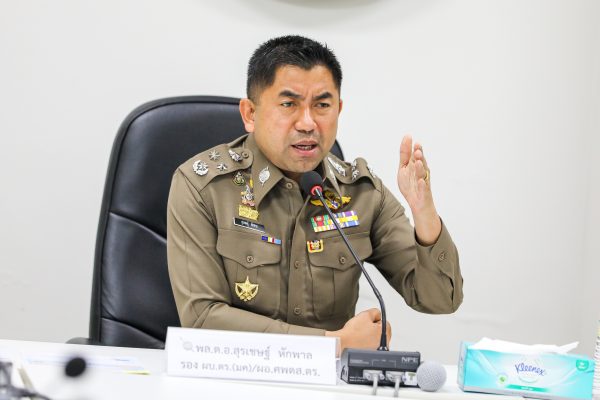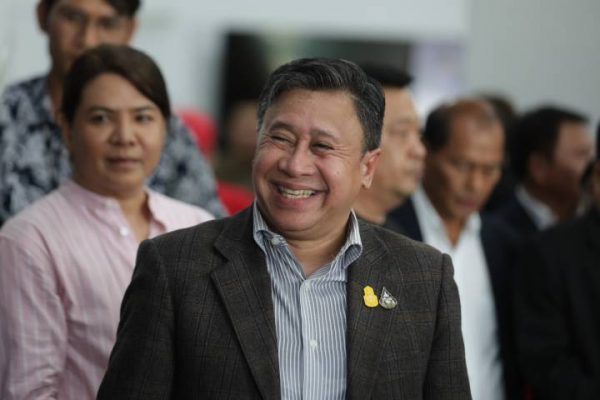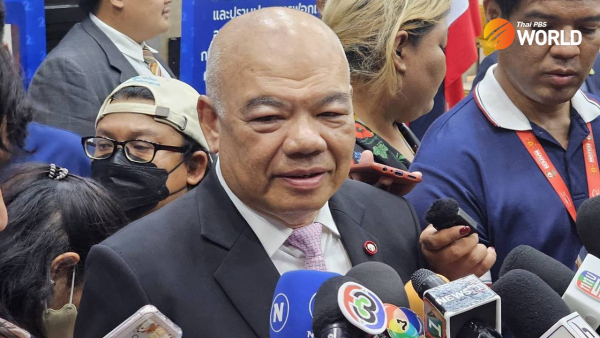Man behind first ‘people’s charter motion’ says fight for democracy will go on

Jon Ungphakorn is the man behind the civil sector’s first ever constitutional-amendment motion to go before Parliament – though it was overwhelmingly rejected by lawmakers.
Only three senators voted for the bill proposed by Internet Law Reform Dialogue (iLaw), the human rights non-governmental organisation which Jon, executive director, founded and also leads.
The current charter, which iLaw’s bill seeks to change, states that it can only be amended with the support of at least one third of the 250-member Senate (84 senators) plus a simple majority from both Houses of Parliament.
The first ever charter amendment backed by citizens rather than political parties, iLaw’s historic – and controversial – bill was one of seven motions debated by Parliament on Tuesday and Wednesday. The motions seek changes to the junta-drafted Constitution which has been in force since April 2017.
The Senate’s overwhelming opposition to iLaw’s draft came as no surprise to Jon. “We expect the iLaw bill to be voted down. I believe so,” he said with a hint of sarcasm just hours before the vote on Wednesday (November 18).
One part of Parliament “does not connect with the social reality that Thailand is changing and young people are demanding democracy”, the iLaw executive director added.
“Democracy” was the keyword used when iLaw – represented by Jon and two colleagues – defended their draft during the parliamentary debate.
The iLaw representatives seemed to be delivering a lecture on participatory democracy in Parliament, of all places.
“People want to see Thailand become a democracy as soon as possible. So, we organised a public signature campaign for our draft,” Jon, 73, told parliamentarians.
ILaw’s programme manager, Yingcheep Atchanont, told Tuesday’s session of Parliament that the NGO’s draft amendment – backed by over 100,000 voters – called for “basic democratic advances found in many democracies around the world”.
He said the “people’s bill” proposed by iLaw reflected the dream of living in a country where the supreme law is written by the people.
The draft is mainly aimed at eradicating the legacy of the 2014 coup, including provisions and organic laws deemed to help the coup-makers stay on in power.
Undeterred by the result of the vote, Yingcheep said iLaw and the bill’s supporters had succeeded in making history by getting a people’s motion for charter change tabled in Parliament.
ILaw’s representatives also dismissed allegations that the NGO was a front for its foreign funders, who were interfering in Thai affairs.
“Such rhetoric is nonsense,” said Chiranuch Premchaiporn, iLaw’s third representative in Parliament. “We have many big issues to deal with and we need to consult with people on certain subjects.”
She insisted that foreign sponsors were “unable to tell iLaw what to do” and described such allegations as attempts to discredit the organisation.
Jon told reporters on Wednesday that he was dissatisfied with certain senators who had made “unfair accusations” against “an organisation I’m proud of”.
“Their claims that iLaw is dictated by its funders are baseless,” he said.
Born on September 19, 1947, in London, Jon is the eldest of three sons born to the renowned economist Puey Ungphakorn and his English wife Margaret.
Puey served as Bank of Thailand governor and as rector of Thammasat University during the politically tumultuous 1970s.
He quit as rector and left Thailand after student protesters were massacred by security agencies and rightist vigilantes at Thammasat’s Tha Phrachan campus on October 6, 1976. Puey lived in London until his death in July 1999.
Jon has two brothers – Peter Mytri and Giles Ji. Peter is a journalist who was senior information officer with the World Trade Organisation’s Secretariat until 2015. Giles Ji, an associate professor at Chulalongkorn University’s Faculty of Political Science, fled Thailand in 2009 after being charged with lèse majesté.
Jon obtained a bachelor’s degree in electrical engineering from the University of Sussex, before becoming a lecturer at Mahidol University.
In 1980, he set up the Thai Volunteer Service for development projects across Thailand. In 1991, he founded the AIDS Access NGO to raise public awareness on HIV/AIDS.
Jon was elected a senator in 2000 after gaining strong support from NGOs and the civil sector.
In 2004, he co-founded the respected and liberal-leaning Prachatai online newspaper. A year later, he was awarded the Magsaysay Award for Governmental Services – exactly 40 years after his father won the same award.
Jon founded iLaw in 2009 to enable people to propose and amend laws by signing petitions to Parliament – a channel opened by the 2007 constitution.
By Thai PBS World’s Political Desk






